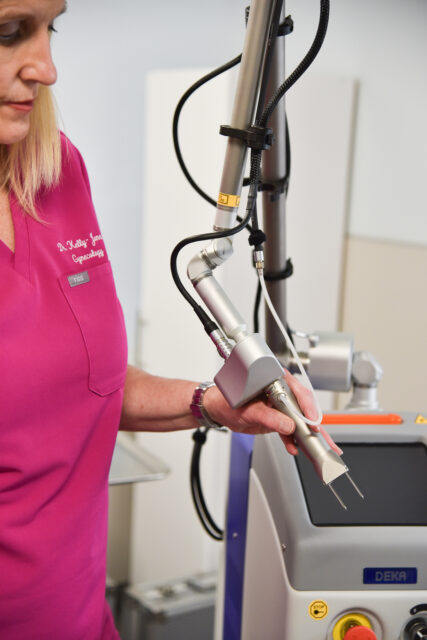 Although menopause has been getting more media attention lately (“menopause is having a moment” being a new catch phrase), many women are still trying to find relief for the physical symptoms it causes. The good news is that with raised awareness and research, women no longer have to suffer through this rite of passage.
Although menopause has been getting more media attention lately (“menopause is having a moment” being a new catch phrase), many women are still trying to find relief for the physical symptoms it causes. The good news is that with raised awareness and research, women no longer have to suffer through this rite of passage.
Dr. Alyse Kelly-Jones specializes in menopause and sexual health at Tryon Medical Partners, and wants women to know there are several treatment options available. What used to be referred to most commonly as vaginal atrophy, genitourinary syndrome of menopause (GSM) is the broader term used today to describe vaginal symptoms (think dryness), sexual symptoms (think pain during sex), and urinary symptoms (think bladder) resulting from the lack of estrogen that occurs both during and after menopause.
Tryon Women’s Center now provides an additional option for menopausal women with GSM. The fractional CO2 laser or Mona Lisa Touch is an alternative to estrogen-based therapy and helps to rebuild collagen in the vaginal tissue, thereby restoring moisture. But is it right for you? Dr. Kelly-Jones provides the ins and outs of this minimally invasive treatment.
Q: What can menopausal and postmenopausal women struggling with vaginal dryness and painful intercourse do about it?
As Dr. Kelly-Jones shares, there are a plethora of treatment options to consider. Women should feel empowered to speak with their clinician to find the right course of action.
“Every woman is different, and what works best for one may not be what’s best for another,” says Dr. Kelly-Jones. “That’s why it’s important to have a comprehensive exam first in order to determine the proper treatment option. Women are suffering and they don’t need to be.”
Q: What is CO2 laser therapy?
As Dr. Kelly-Jones describes, the CO2 laser helps those with GSM by creating micro-injury to the vaginal opening (vulva) and vagina, signaling the body to repair the area by bringing in new collagen and blood vessels. In helping the tissue repair, moisture is restored.
If laser therapy is recommended for patients at Tryon Women’s Center, they will be scheduled for three sessions done six weeks apart. At the appointments, a numbing cream is first applied to the vulva. After about 20 minutes with the numbing cream, the laser is used for one to two minutes in the vagina and one to two minutes on the vulva.
While some women may find it painless, others may feel like they have a sunburn in that area for 24-48 hours, and are pain-free after that. By the second treatment (six weeks later), patients should be seeing some percentage of improvement.
After three sessions, patients will only need one additional treatment done every 12-24 months as maintenance.
Q: Why would laser treatment be recommended over other treatment options?
There is an abundance of research supporting laser therapy as a safe, effective, non-invasive treatment option for those with genitourinary syndrome of menopause experiencing a loss of lubrication leading to itchiness, dryness, pain with sex, etc. Since it’s an alternative to estrogen-based therapies, it’s also a viable choice for breast cancer patients suffering from GSM.
And it’s convenient.
“Some women do not want to have to take a daily medication, apply a cream or continually refill prescriptions,” shares Dr. Kelly-Jones. “It’s appealing to know that women can choose the laser and not have to do anything else.”
Q: Is laser therapy covered by health insurance?
The CO2 laser treatments are not covered by insurance. At Tryon Women’s Center, each treatment is $600 and $1,500 total if paying for all three sessions up front.
Have more questions about laser therapy and if it’s right for you? Schedule an appointment with the Tryon Women’s Center to learn more.

